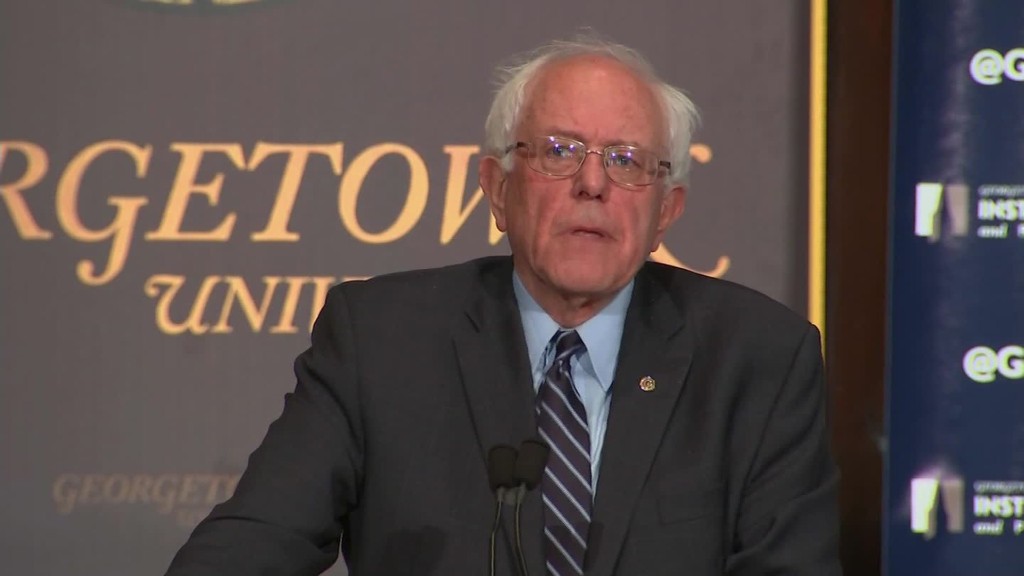
Bernie Sanders has pulled back the curtain on how he would pay for his $1.4 trillion a year Medicare for All proposal.
The short answer: Much higher taxes, primarily on the richest households.
In fact, his plan calls for the largest proposed tax increase in modern history, according to Roberton Williams, a fellow at the Tax Policy Center. "It's huge."
Those increased taxes, though, are intended to finance a public health care system in which everyone's medical expenses for eligible procedures, treatments and appointments are paid for fully.
And the campaign asserts that 95% of Americans will actually end up keeping more of their income than they do today because they will no longer have to pay premiums, deductibles and co-payments.
Still, who exactly would pay more and just how much more is a bit more complex than all that, since Sanders' proposals also double as his tax reform plan.
The new premium tax that will hit most Americans: Sanders would charge a 2.2% "income-based" premium. It would be assessed on taxable income (which includes wages, investment income, etc. minus certain tax breaks).
Effectively, Williams said, this means marginal rates across the board will go up -- e.g., the 10% bottom rate becomes 12.2%; 15% become 17.2%, 25% becomes 27.2%, etc.
In addition, employers would have to pay a 6.2% tax on each worker's wages to support the system. This payment would replace the money employers currently spend to subsidize employee health insurance.
Who wouldn't have to pay the premium tax: The Sanders campaign estimates that about 26% of households -- or roughly 44 million filers -- will not have to pay the 2.2% premium because the value of their standard deduction plus personal exemptions will exceed their total income.
That means, for example, a family of four making $28,800 or less would be exempt.
Higher top income tax rates for high-income households: Anyone with taxable income over $250,000 would be subject to a higher top rate on their earnings.
Those with incomes between $250,000 and $500,000 would owe a top rate of 37%, up from 33% or 35% currently.
Related: How Hillary Clinton wants to make the rich pay their 'fair share'
For anyone at the 39.6% top rate today, they would pay 43% on taxable income between $500,000 and $2 million; 48% on income between $2 million and $10 million and 52% on income over $10 million.
Now add the 2.2% premium tax to those rates and you end up with new top rates of: 39.2%, 45.2%, 50.2% and 54.2%.
Higher capital gains and dividend rates too: Most households pay a 20% rate on long-term capital gains and dividends.
Sanders instead would tax investment income at ordinary income tax rates for anyone with taxable income over $250,000.
So a person with taxable income over $10 million would pay 54.2%.
How else the rich will pay more: Sanders also wants to limit the value of itemized deductions for high-income filers and impose a higher estate tax.
Separate from his Medicare plan, Sanders has also proposed to bolster Social Security funding by making the wealthy pay more into the program. He would do so by subjecting any income over $250,000 to the 6.2% payroll tax, which currently only applies to the first $118,500 in wages.
So what does this all mean for those making bank?
You'll be paying more money than you do today to the federal government.
Not including the premium tax or the increased payroll tax, figure an additional $100,000 or so if your income clocks in around $2 million, according to campaign estimates. Someone making just under $7 million would pay roughly $607,000 more. And anyone making $25 million would pay about $3.2 million more.
In terms of a combined income and payroll tax rate, a filer with more than $10 million in taxable income could end up paying at least 63%, up from 39.6% today.
That rate would go higher if any of his investment income is subject to the 3.8% Medicare surtax, a legacy of Obamacare that Sanders decided to keep.
Correction: The original version of this article incorrectly stated that Senator Sanders' proposal to tax capital gains and dividends as ordinary income would affect not only the rich, but also lower income elderly filers who have investment income. His proposal would only raise the investment income tax rate on those making more than $250,000, the Sanders campaign said.
